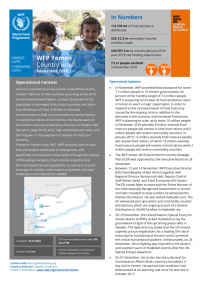WFP Yemen Country Brief, November 2018
In Numbers
113,776 mt of food assistance distributed
US$ 11.2 m commodity voucher transfers made
US$ 507.3 m six months (January 2018-June 2019) net funding requirement
7.2 m people assisted in November 2018
Operational Updates
• In November, WFP provided food assistance for some 7.2 million people in 19 Yemeni governorates, 94 percent of the monthly target of 7.6 million people. WFP is preparing to increase its food assistance reach in Yemen to avert a major catastrophe. In order to respond to the increased levels of food insecurity caused by the ongoing crisis in addition to the decrease in the economy and increased food prices, WFP is planning to scale up to assist 10 million people in December 2018 whereby 8 million severely food insecure people will receive in-kind food rations and 2 million people will receive commodity vouchers. In January 2019, 12 million severely food insecure people will receive food rations, of which 10 million severely food insecure people will receive in-kind rations while 2 million people will receive commodity vouchers.
• The WFP Yemen 2019-2020 Interim Country Strategic Plan (ICSP) was approved by the Executive Board on 28 November.
• Between 12 and 14 November, WFP Executive Director (ED) David Beasley visited Yemen together with Regional Director Muhannad Hadi, Deputy Chief of Staff Rehan Zahid, and Chief Economist Arif Husain. The ED visited Aden to meet with the Prime Minister of the Internationally Recognized Government in Yemen, and later travelled to Sana’a where he witnessed the blanket distribution. He also visited Hodeidah port. The ED witnessed port operations and commodity voucher distributions which are ongoing as part of a blanket distribution to 36,000 families in Hodeidah city.
• On 23 November, the United Nations Special Envoy for Yemen Martin Griffiths visited Hodeidah to lay the groundwork in light of the upcoming peace talks in Sweden. The Special Envoy stated that the UN should urgently pursue negotiations for a leading UN role in ensuring the functioning of the port and to preserve the critical humanitarian pipeline. Unfortunately, on 26 November, fierce fighting was reported in the eastern and southern parts of Hodeidah shortly after the UN Special Envoy’s departure.
• On 01 December, the Under-Secretary General for Humanitarian Affairs Mark Lowcock concluded a 3-day visit to Yemen. He warned that conditions had deteriorated at an alarming rate since his last visit in October 2017. He reiterated his call for a cessation of hostilities and urged the parties to the conflict to facilitate humanitarian assistance and protect the supply of food and other essential goods coming into the country.
• In response to the increased fighting in Hodeidah governorate, a Rapid Response Mechanism was established in June to accelerate the humanitarian response for newly displaced persons and to ensure their most basic needs are addressed during their displacement. In particular, WFP is providing displaced families with Immediate Response Rations (IRR) which are sufficient for five days through Humanitarian Service Points and Humanitarian and Humanitarian Transit Sites. From the start of the large-scale internally displaced persons (IDPs) response in June until November, WFP provided IRRs to 128,975 households.
• In addition to the Immediate Response Rations provided to displaced people fleeing violence from Hodeidah, WFP is also providing a one-off General Food Assistance (GFA) ration, either in-kind or via a commodity voucher to all newly displaced people, sufficient for one month. Thus far, WFP has provided 584,406 people with a one-off GFA ration—252,318 IDPs have received in-kind general food distributions (GFD) and 332,088 have received commodity vouchers in 14 governorates.
• Between January and November 2018, WFP admitted 430,639 children aged 6 to 59 months and 298,283 pregnant and lactating women (PLW) into WFP’s Targeted Supplementary Feeding Programme (TSFP). For WFP’s programme aimed to prevent moderate acute malnutrition (MAM) called the Blanket Supplementary Feeding Programme (BSFP), WFP admitted 277,833 children aged 6 to 23 months and 379,598 PLW into the programme.
• WFP has scaled up its programme for treating moderate acute malnutrition (TSFP) for children under the age of five and PLW. Starting in October, WFP began implementing TSFP programmes in 3,008 health facilities in 287 districts, an increase of 574 health facilities over the previous 6 months. In addition, WFP has created different scenarios to increase BSFP programmes throughout the country based on the results of the latest integrated food security phase classification (IPC).
https://reliefweb.int/report/yemen/wfp-yemen-country-brief-november-2018


